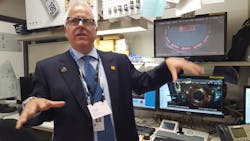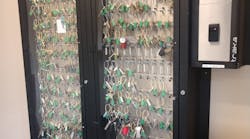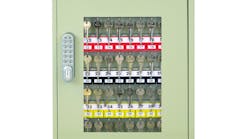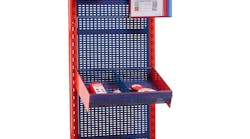Hidden beneath the glitz and glamour of the Casino de Montréal, one of the world’s largest gaming establishments boasting close to 600,000 square feet of casino space, lies the world of Claude LaRamée. He is the Supervisor of Security Operations and Technical Support for this massive entertainment venue that is located on Île Notre-Dame and housed in the France and Québec pavilions that were built for Expo 67. He also happens to be the facility locksmith.
On a recent visit to Montreal I was treated to a tour of the facility by LaRamée, which began on the second of the casino’s six floors. This presents a formidable security challenge when you consider most Las Vegas-style casinos are contained on one floor – massive as they may be. With five floors of gaming, five restaurants, four bars and a cabaret hall, the Casino de Montréal is open year-round featuring baccarat, blackjack, poker, roulette, keno and more than 3,000 slot machines. The casino consists of three interconnected buildings. Two of these, the France Pavilion and the Québec Pavilion, were built for the 1967 International and Universal Exposition or Expo 67. The third is an annex built by the casino to the south and east of the main building. An enclosed bridge joins the annex to the former Quebec Pavilion.
These Locksmith Don’t Gable with Security
The casino is under the control of Loto-Québec, which is a Quebec government corporation whose mandate is to operate games of chance in the province in an orderly and measured way. It was created in 1969 to implement a public lottery. Since that time, Loto-Québec’s shareholder–the Government of Quebec, has given the corporation new mandates that have, over the years, led to a diversification of its activities. This has led to expansion beyond scratch-offs to four full-blown gaming facilities in the province of Quebec, along with video lottery terminals (video poker) in bars throughout provincial cities.
LaRamée and his staff of locksmiths and security technicians cut every key to every slot machine, video poker game, in addition to handling every point of egress at the Casino de Montréal. The scale of the job is not lost on him.
“This is my office, and this is where the magic happens,” says LaRamée, pointing to the well-lit but cramped space filled with key-cutting machines of various makes and models and walls lined with codebooks. “The technical team, we're four guys plus me, we're all certified. In Québec, we must be certified to do our jobs, so even me, we're all locksmiths and technical people. Every key that is made for Loto-Québec is made here. It is a huge responsibility for a relatively small staff of locksmiths. We have complete control. All the codes are only seen by five people, not even my boss sees the codes.”
LaRamée stresses that the fewer people who interact with the keys and the codes, the better the integrity of the security process will be, no matter what your title may be. It is a process he and his staff have perfected with Loto-Québec. Knowing that there is a single source for keys and for key codes is a system that works. However, his security technicians are more than locksmiths. LaRamée says that in addition to tending to the physical lock and key aspects of the job, his team also performs a fair amount of security technology benchmarking for his facility and the others across the province.
The Keys to Security
“We do a lot of things. My team takes care of the keys, locks, access control system, video system, LPR and everything that is attached to security,” says LaRamée, but it is the locksmith side that he deems most crucial to the safety and security of all casino operations. “All the buildings of Loto-Québec, the four casinos, the two gaming salons, and every commercial building have all their keys are made here. Every key has a stamp on it and serialized number from the manufacturer. We know when a key is cut, when it's created and when it's disposed of. So, when we must change the lock on a particular door or an entire facility, we have a complete audit trail of that key’s history.
“Every locksmith knows that the lock and key are the basis of a good security system, and the first point of entry is the door. From there you move onto some sort of door hardware. After that, if you’ve got money, you install a high-security lock, then (electronic) access. Then if you’ve got a real nice budget you can put up (video) cameras,” explains LaRamée. “So that's the total security package, but it's always starting at the door. If you put an access system on the door and you don't have the right hardware and software, you may as well leave the door open. High security doesn’t have to be expensive if you attend to the basics and do the little things right.”
Key Control is Where It’s At
With LaRamée and his staff overseeing more than 72,000 locks and over 12,000 standard doors in the Casino de Montréal, key control is a top priority. The staff has used Prosystech’s SimpleK key and facility management software. The locksmiths appreciate that SimpleK offers a large portfolio of modules, tools, functions and features to overcome challenging tasks of key and facility management. The software is a scalable and flexible solution that can be used from basic stand-alone to thousands of users, from Windows to Web based environment, from tiny to huge scale facilities.
With SimpleK, LaRamée can manage all the data contained in his master key systems and keys, with system structure (tree view), keying levels, combinations, functions, types, hook numbers, associated cylinders and doors, number of existing duplicates, historical data, etc. Existing list of keys and combinations can be imported with SimpleK’s tools.
“Key control is crucial for us. SimpleK is a nice product. You can add all your codes and put almost any type of data on it. Once you’re done, all the keys are secured in a key keeper from a key system,” he adds
Know the Mission
At the end of the day LaRamée realizes the security technology and protocols you provide are based on the business goals of the organization you work for and the customers your solutions impact. Whether it is as basic as a lock and a key or a full-blown IP video surveillance system, if the customer isn’t happy, you have failed.
“I always feel that security people are dinosaurs -- and that includes me. Even if I think I’ve got eyes wide open during a project, sometimes you look back and realize it could have been better or you missed something. Realistically, your project and eventual solution depends on what you can afford in the budget and what are you allowed to do related to the building code,” he says. “As a locksmith and a security professional, understanding how the technology you select for a job has lasting impact on the functionality of that facility. It is our job to make the process as easy as possible and ask that simple question – how can a solid security plan make this a better company.”






